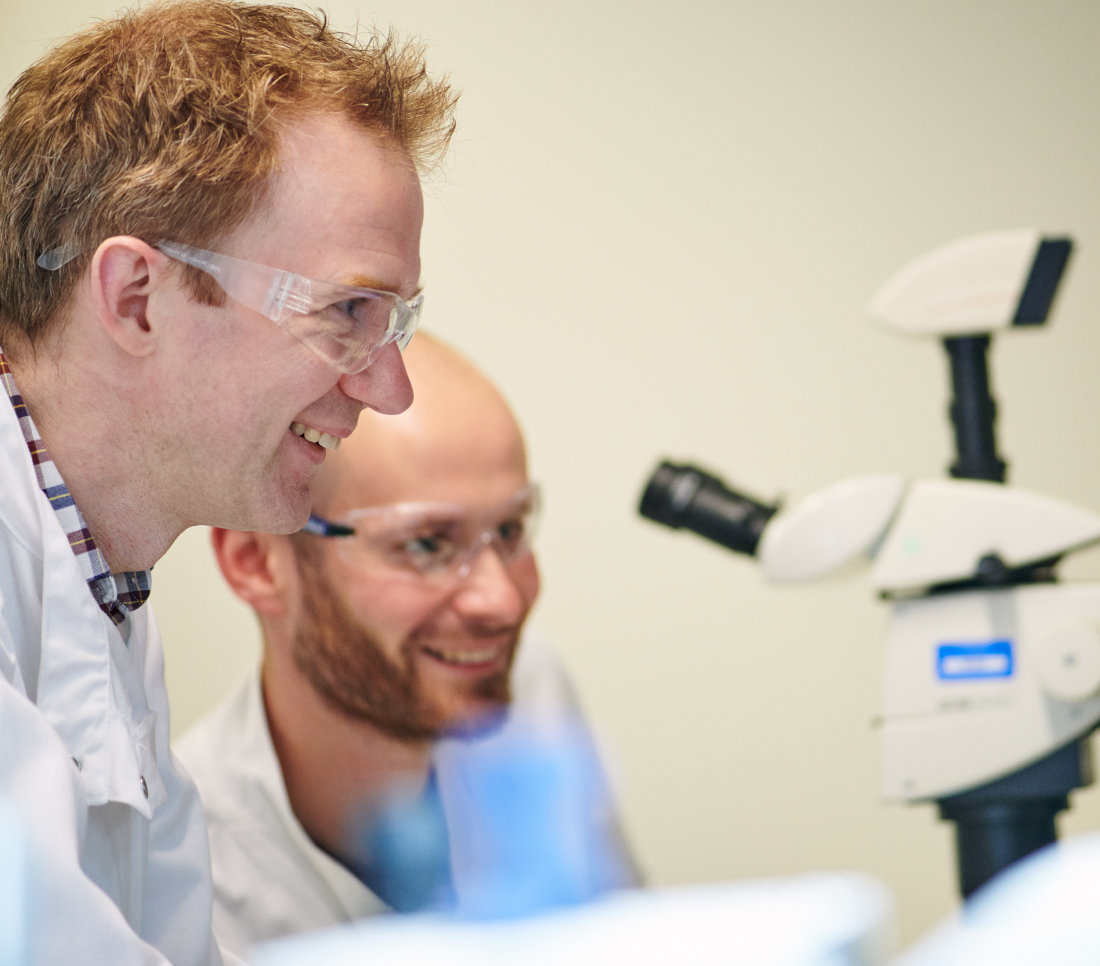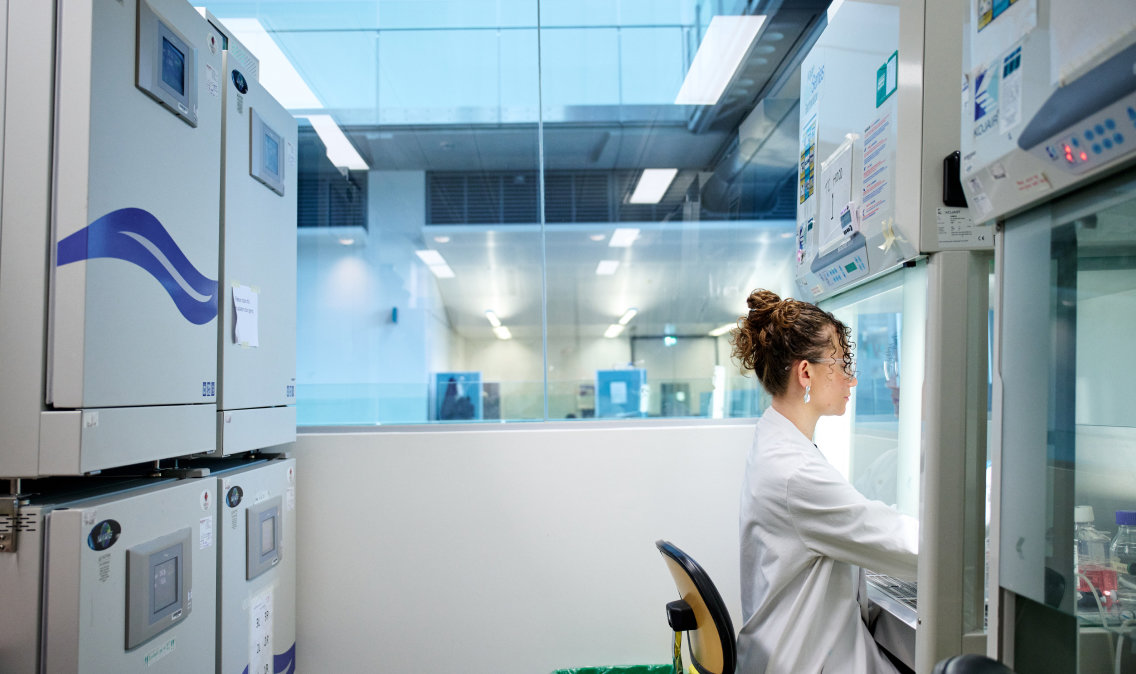Executive Summary
Read about the events and achievements that have defined Cancer Research Horizons' 2022/23 financial year.
Continue

FURTHER FASTER TOGETHER: We are beating cancer
A year of growth and expansion characterise Cancer Research Horizons’ 2022/23 financial year, as our organisation marked its first year since uniting the strengths of our established drug discovery engines with our network of world-class biology, cutting-edge technology platforms and clinical expertise. Cancer Research Horizons exists to beat cancer, by taking cutting edge innovations from the lab bench to the bedside, translating them into effective treatments and diagnostics for cancer patients. Changing our approach to drug discovery and commercialisation enhanced coordination across the organisation, the performance of existing programmes and teams and augmented the launch of new initiatives, all dedicated to the common goal of translating discoveries into clinical benefits for patients and society.
During the last financial year, the total income generated from royalty, Therapeutic Innvovation, and other income streams and activities reached £79m. Cancer Research Horizons reinvested £22m in Cancer Research UK after sharing with partner institutes and deducting operational costs, including the cost of employing almost 250 people. The organisation supports drug discovery research facilities nationally, with sites based in London, Cambridge, Newcastle and Glasgow, as well as occupying offices in London.
Notably, the Cancer Research Horizons Ventures team launched a new Seed Fund and took equity interests in seven startup companies. These equity interests grow the total number of startups in our portfolio to 68 companies. Additionally, the inaugural Cancer Research Horizons Innovation & Entrepreneurship Awards, an event that celebrated the UK’s most innovative and enterprising efforts in oncology, took place in November 2022.
The Cancer Research Horizons Search & Evaluation teams met with over 470 principal investigators, leading to 118 invention disclosures and 45 patents filed. The Commercial Partnerships team signed 106 commercial deals established to advance novel assets and platforms with the potential to deliver clinical benefits to cancer patients.
During 2022/23, the total number of active licensing agreements and agreements with unique partner companies reached 448 and 505, respectively. These numbers include the activities of two divisions: Commercial Partnerships and CancerTools.org. In this review, you will find numerous examples of innovative research and development collaborations along the entire diagnostic and drug discovery and development continuum. At the heart of each of them is a principal investigator or team of researchers championing discoveries and innovations that promise to change the cancer landscape.
Tiffany Ma
Founder of GambitBio
Awards: Translational grants and awards progressing novel ideas
“The Venture Builder Incubator gave us the technical knowledge we needed to run a company. I feel more confident and my mindset has shifted thanks to the coaching, mentoring and support from the university and our cohort of like-minded entrepreneurs.”
Can you tell us a bit about your background and how you came to set up GambitBio?
I did my undergrad (molecular cell biology) and master’s (Translational Medicine) at UC Berkeley in California and then I came to the UK to do my PhD in oncology at University of Oxford. I started my postdoc in 2023 and I created GambitBio as part of my entry for University of Oxford’s All-Innovate business idea competition.
What real-world challenge do you want to address?
We want to empower everyday people to take control of their health, because depending on which healthcare system you're in, whichever country you're in, there are varying degrees of access to healthcare and not everyone is able to conveniently undertake routine or preventive exams.
GambitBio exists to push for early detection and reduce the number of cancer-related deaths. We want people to be able to detect what is wrong earlier so clinicians can intervene and treat the problem sooner. Early detection can give people up to 95% survival rate over a 10-year period for certain cancer types.
What motivates you as an entrepreneur?
I want to use what I've learned from academic research and my scientific career so far to improve people's lives by creating a novel product. This means combining scientific thinking with a commercial mindset, which I enjoy a lot. As a scientific entrepreneur, I’m motivated by the excitement of combining what I know in novel science and putting it into the commercial setting where I can create a novel product that addresses an unmet need in real life. It’s also the opportunity to work with really smart and passionate people from different parts of the innovation ecosystem including investors, scientists, clinicians, lawyers, academics, founders, manufacturers and more.
“I hadn’t found a programme like the Venture Builder Incubator anywhere else, which is why I applied to join. I have found the Venture Builder Incubator to be very special – the programme is a unique mesh of community building activities as well as technical workshops.”
What success have you seen so far?
During the incubator programme, I was able to gather initial investment from angel investors. This was largely because of the help I got from the Venture Builder Incubator team, who taught me how to pitch effectively by telling a captivating story. They advised me to tone down the technical language when speaking to investors because most of them don’t come from a scientific background. This audience needs to understand the product, market and our business model more than anything else.
How did your partnership with Cancer Research Horizons enhance your experience with the Venture Builder Incubator?
It’s a privilege to be sponsored by Cancer Research Horizons. The financial support we received as part of the programme was very helpful because without that, we couldn't have travelled to Edinburgh this frequently to meet other people in the innovation ecosystem, including entrepreneurs, investors and stakeholders from across the UK. It can’t be overstated how important it is to meet people in person rather than on Zoom. Many amazing entrepreneurs from the University of Edinburgh and the wider Scottish ecosystem have opened doors for us with angel investors, and fellow founders.
What role have the University of Edinburgh, Cancer Research Horizons and Venture Builder Incubator played in your entrepreneurial journey?
It demystified entrepreneurship for our team, as we met like-minded entrepreneurs who are also just getting started. It made the entire process less scary, and it felt good to have a friendly community filled with people who want to help each other.
What is next for GambitBio?
We will finish working on a second prototype in the next three to four months, and will start our next round of seed funding by the end of 2023. We're passionate about GambitBio and are motivated by our core mission to empower the everyday person to take control of their health!
